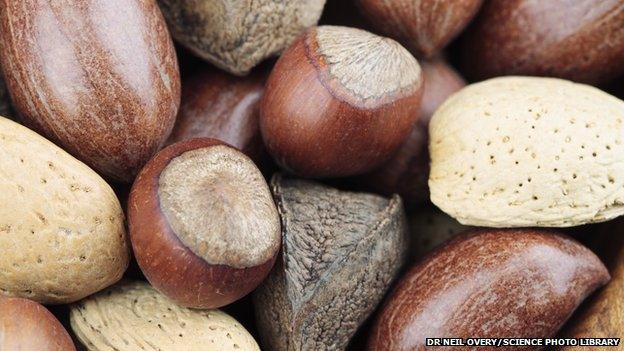Eating nuts during pregnancy 'may curb allergies'
- Published

Children are less likely to have a nut allergy if their mother ate nuts while pregnant, a study has concluded.
The work, published in JAMA Pediatrics, looked at the health and diets of more than 8,000 children and their mothers.
The US researchers believe that early exposure in the womb creates natural tolerance to certain foods.
But the findings conflict with other studies that have shown either no effect or a possible risk from nut consumption.
Experts say this makes it difficult to offer firm advice to mothers-to-be, with the exception of women who are themselves allergic to nuts and should therefore always avoid eating them.
Conflicting evidence
The study authors, led by Dr Lindsay Frazier of the Dana-Faber Children's Cancer in Boston, concluded children were a third less likely to have a nut allergy if their mothers had eating nuts during pregnancy.
This included tree nuts such as walnuts, almonds, pistachios, cashews, pecans, brazils, hazelnuts and macadamias as well as peanuts.
The authors say this suggests that nut consumption may protect against future allergies.
But there are other factors that may also explain this difference.
For example, the women who ate nuts were also more likely to have healthier diets containing plenty of fruit and vegetables.
Dr Adam Fox, consultant children's allergist at Guy's and St Thomas's NHS Foundation Trust, said the findings were interesting but inconclusive.
"To make things even more complicated, there is also strong evidence to suggest that nut allergy doesn't develop until after birth and that it is exposure of the infant's skin to nut protein that is most important in the development of allergy.
"With such differing results from different studies, it is currently impossible to offer advice about exactly what mothers should do regarding nut consumption during pregnancy but current international guidance is that there is no need to either avoid nuts, nor to actively eat them."
- Published14 October 2013